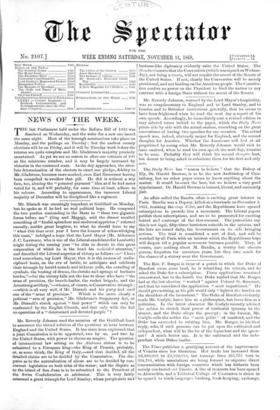The Rev. F. Burges is vicar of a parish in
which the Duke of Beaufort owns some land, lie is rebuilding his schools, and he asked the Duke for a subscription. Three applications remained unanswered, but to the fourth the Duke replied that Mr. Burges had at the last election " worked" against Colonel G. Somerset, and that he considered the application " most impertinent." He should give nothing, as his gift would only "lighten the burden on the shoulders of the incumbent." The Duke of Beaufort evidently reads Mr. Carlyle, hates him as a philosopher, but loves him as a politician. In the latter character Mr. Carlyle recently advised the nobles to stretch their power of territorial tyranny to the utmost, and the Duke obeys the precept ; in the former, Mr. Carlyle calls the nobles the " most polite" of mankind, and the Duke has succeeded in refuting him. Mr. Burges, in his final reply, asks, if such pressure can be put upon the cultivated and independent, what will be the lot of the dependent and the ignor- ant? A much better one. It is the cultivated and the inde- pendent whom Dukes loathe.


































